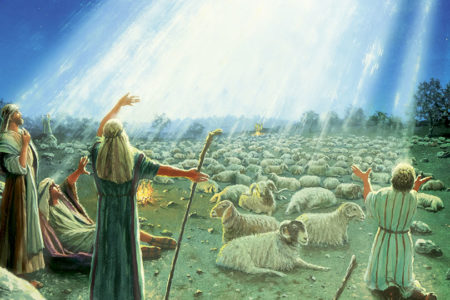The Test of Knowing God
1 John 2:3–11
It is easy for someone to say, “I know God”; but what does that really mean? First John 2:3–11 provides three tests or evidences of what it means to know God and be in true fellowship with Him. Each begins with the phrase He who says (vv. 4, 6, 9). By applying these tests to one’s life, a person can see whether he or she really knows God and has ongoing fellowship with Him.
The Test of Applying
The phrase now by this connects the first two verses in this chapter, which speak of Jesus as our Advocate and “propitiation [satisfaction] for our sins” (v. 2), with the verses that follow: “Now by this we know that we know Him, if we keep His commandments. He who says, ‘I know Him,’ and does not keep His commandments, is a liar, and the truth is not in him” (vv. 3–4).
Scripture says we can “know” God is our Advocate and propitiation. The word know appears 25 times in John’s epistle and does not refer to some abstract concept about God or Jesus Christ but to knowledge we gain through personal experience by keeping His commandments. Know is used twice in verse 3, emphasizing that believers can be certain their relationship with the Lord is ongoing and abiding.
It is possible to have assurance that we are in fellowship with God “if we keep [keep on keeping] His commandments” (v. 3). This conditional clause challenges believers to examine their behavior to see if they meet the conditions of keeping God’s commandments.
The commandments referred to are not the Old Testament Mosaic Laws but, rather, the New Testament instructions, precepts, and directives Christ and the apostles taught that made God’s will known. Keep means to guard with reverence the precepts learned, not only observing and obeying them, but regarding them as precious. Christians who possess a growing love for Christ will have a passionate desire and determination to honor God’s precepts. Doing so will give them internal (experiential) knowledge that they walk in fellowship with God the Father through Christ.
If a Christian says, “I know Him [God]” but fails to obey His instructions, that person “is a liar, and the truth is not in him” (v. 4). If we really know and understand God’s character and what He desires of us, we inevitably will obey Him. But if there is a sharp contradiction between our profession to know God and the way we live every day, we lie about knowing God. Knowledge of Him cannot merely be academic. It must be woven into the fabric of a Christian’s daily existence. Otherwise the claim to know God is devoid of “truth.”
In contrast, the apostle John explained the positive results for one who obeys God: “But whoever keeps His word, truly the love of God is perfected in him. By this we know that we are in Him” (v. 5). If we obey the precepts and directives of God’s Word, then we will truly experience God’s love “perfected” (completed) in us. Obedience to God’s will results in experiencing God’s love, which is brought to fruition in the believer. The display of this love in a Christian’s life will be seen by others and becomes a witness to them.
The reality of God’s love completed in us provides the grounds, knowledge, and inner assurance that “we are in Him,” meaning we have fellowship with God the Father. Notice that knowledge of God will produce love for and obedience to His Word.
The Test of Abiding
Verse 6 says, “He who says he abides in Him ought himself also to walk just [even] as He walked.” “He who says” refers to someone who claims to abide in and maintain fellowship with God. Such individuals “ought” to be living as Christ did. They ought not drift away from fellowship with God or engage in practices that are inconsistent with or contrary and disobedient to the Bible. People who consistently obey God’s Word abide (dwell, remain, and continue) in an ongoing fellowship with Him and walk “just [even] as” Christ walked; that is, they pattern their lives after His.
Believers ought to act as Christ did while He was on Earth. Christ loved and obeyed God the Father. He loved righteousness and hated sin, but He loved sinners. That is what it means to love Christ and abide in close communion and fellowship with God throughout one’s daily walk.
John said these are old concepts: “Brethren [Beloved], I write no new commandment to you, but an old commandment which you have had from the beginning. The old commandment is the word which you heard from the beginning” (v. 7).
This commandment was not new in kind or quality to John’s readers. In fact, it went back to the inception of Christ’s ministry some 60 years earlier and was around before John’s readers became believers.
However, in the very next breath, John called the commandment new: “Again, a new commandment I write to you, which thing is true in Him and in you, because the darkness is passing away, and the true light is already shining” (v. 8).
Did John contradict himself? No. The word again continues the thought started in verse 7, but views it from a different perspective. The key phrase, “which thing is true in Him and in you,” gives credence to what John said was a “new commandment”—one that dealt with the subject at hand, which is the commandment of “love” (Jn. 13:34–35; 15:12).
This new quality of love was exhibited in Jesus Christ through His life, teaching, and death on the cross. John said this new quality was also true in the readers (“in you”) because they were in Christ. Thus believers should show one another the type of love Christ manifested while on Earth.
The evidence that this new commandment of love already operates in the lives of true believers is that “the darkness is passing away, and the true light is already shining.” “Darkness” refers to evil in the world, as seen in the lives of people who are under Satan’s control. Yet in the midst of this darkness, the light and love of God through Jesus Christ is revealed. People are experiencing the light of God’s redeeming love, continually causing the darkness to be passing away. However, it will not be eliminated until Christ returns to Earth and rules.
The phrase “already [now] shining” emphasizes that the “true light” was removing darkness from the earth in John’s day, and the process continues today through all who accept Christ.
The Test of Affection
The third test of whether a professing believer truly knows God has three aspects. Each involves a relation-ship to love:
A Professing Believer Without Love. “He who says he is in the light, and hates his brother, is in darkness until now” (v. 9). These types of people do not consistently live up to what they profess to believe. They claim to be Christians, but their hatred for someone in Christ contradicts their claims. There is a flagrant disconnect between profession and practice. Jesus Christ commanded believers to love even their enemies (Mt. 5:43–47). Thus someone who hates a fellow Christian cannot be a true disciple and follower of Christ.
Hatred for “a brother” does not refer to an occasional outburst but to an ongoing, deep-seated malice that is expressed persistently toward people who are in Christ. One who hates does not walk in the light and love commanded by Jesus Christ. Though the word brother refers to both men and women in the church, Christians should show love to unbelievers as well.
Someone filled with hatred for a brother lives in “darkness” and is not experiencing the transformation from darkness to light that Christ brings. The words until now reveal there still is an opportunity for such an individual to come in repentance through Christ.
A Professing Believer Who Expresses Love. “He who loves his brother abides in the light, and there is no cause for stumbling in him” (1 Jn. 2:10). People who show love prove their professions in Christ are genuine. They continually order their daily walk in Christ’s love. The word for “love” (Greek, agapao) is not a natural type of love but, rather, an unselfish giving and pouring out of one’s heart and self to others. This love shows that the believer “abides in the light” and is a true disciple of Jesus Christ, continually living in obedience to the light of God’s Word.
The verse also says “there is no cause for stumbling in him.” Two meanings are possible here: The one walking in God’s light (1) will not put an obstacle before his brother that would hurt him or cause him to stumble in Christ or (2) will not have a stumbling block put in his way.
A Professing Believer Who Expresses Hate. “But he who hates his brother is in [the] darkness and walks in [the] darkness, and does not know where he is going, because the darkness has blinded his eyes” (v. 11).
John finalized his argument by contrasting the one who lives in the light of God (v. 10) with the one who “hates his brother.” Three phrases describe the condition of people who are filled with hatred.
First, their spiritual state “is in darkness.” Lacking God’s love and light results in being cut off from God’s fellowship (cf. 1:5).
Second, they walk “in darkness,” meaning their daily lives are permeated with and tainted by darkness, and over time the darkness will consume them.
Third, they have no knowledge of “where [they are] going.” Their spiritual blindness robs them of an understanding as to the road their lives are taking. Being dominated by darkness and hatred cuts them off from the light of God that would bring them to repentance and redemption.
People who think they are Christians should examine their lives in light of John’s words. Where do you stand? Do you pass the test of really knowing God?








Really been helpful. Be blessd